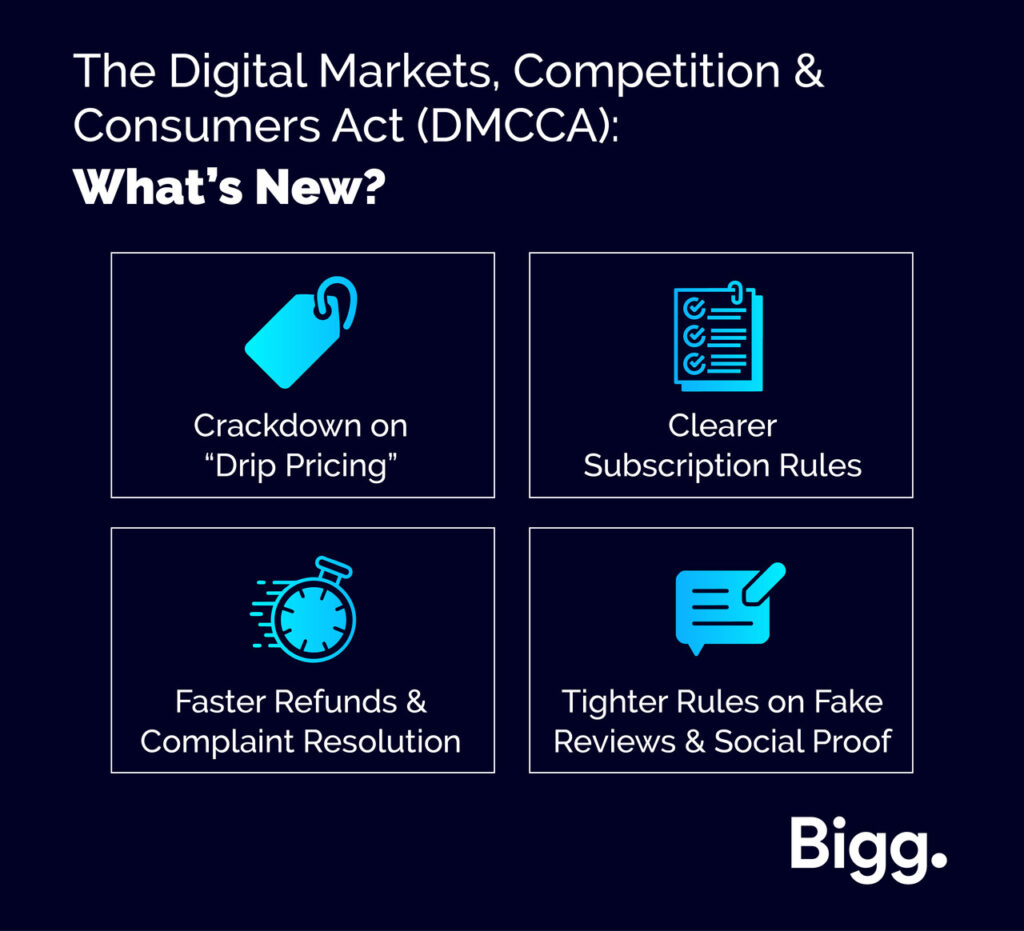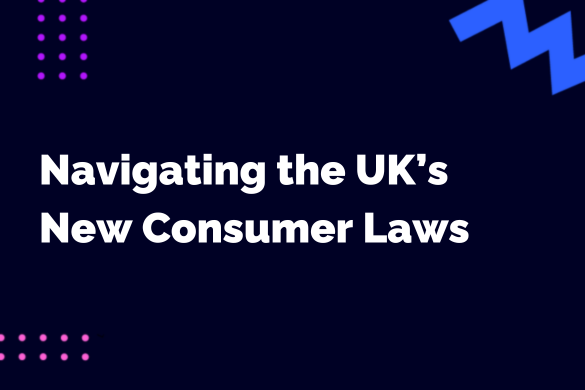The UK has rolled out new consumer protection laws, like the Digital Markets, Competition and Consumers Act (DMCCA), that are reshaping how brands and agencies operate online. And while it might be easy to pass off these changes as simple bureaucratic tweaks, the reality is that they’re a wake-up call to rethink how we treat audiences, collect data and present our products or services.
At Bigg, we believe ethical marketing isn’t just about staying legal, it’s also about doing better by your clients. So in this blog, we’ll unpack what the new laws mean, what dodgy practices are now out of bounds and how your brand can thrive by being transparent, honest and respectful.
What’s Changed? A Quick Overview of the DMCCA
The Digital Markets, Competition and Consumers Act (DMCCA), introduced in 2024 and coming into full effect in 2025, is designed to tighten consumer protections and rein in the power of big digital platforms. But even if you’re not a tech giant, the rules apply.
There are a few key developments that you should be aware of:
Crackdown on “Drip Pricing”
All costs, including optional extras, must be disclosed upfront.
Clearer Subscription Rules
Businesses must make it easier to cancel recurring payments.
Faster Refunds and Complaint Resolution
Timely consumer support is now legally expected.
Tighter Rules on Fake Reviews and Social Proof
Endorsements must be genuine and provable.

This all boils down to a common theme: stop messing customers around and start being upfront!
How the New Laws Affect Digital and Content Marketing
The DMCCA affects how we:
- Collect and use consumer data
- Write website and ad copy
- Design pricing pages
- Partner with influencers and affiliates
With this in mind, digital marketers now need to:
- Be super clear about pricing and subscription models
- Prove that testimonials or reviews are legitimate
- Ensure influencer posts include visible disclaimers when paid-for
- Avoid “dark patterns” that manipulate users into choices they wouldn’t otherwise make
In other words: if your strategy depends on vague wording, hidden terms or emotional manipulation, you might want to rethink it.
What Counts as Misleading or Manipulative in 2025?
The new rules are particularly tough on manipulative tactics. Here are just a handful that might now land you in hot water:
False Urgency
Claiming something is “limited time only” when it’s always available.
Bait-and-Switch Pricing
Advertising a price that doesn’t include required fees.
Hidden Subscription Traps
Making it easy to sign up but hard to cancel.
Faked Social Proof
Using bots or fake reviews to build trust.
Interface Trickery
Hiding the cancel button or auto-selecting add-ons.
These tactics are no longer considered just bad UX, they’re potential legal violations.
Building Trust with Ethical Transparency
Now, the antidote to manipulative marketing? Transparency. When you’re honest, clear and respectful of your audience’s autonomy, they’ll return the favour with loyalty and trust. In fact, 94% of all consumers are far more likely to be loyal to a brand when it commits to full transparency.
There are a few ways that you can show that you’re serious about this:
Use Plain Language
Avoid jargon or small print trickery.
Make Terms Obvious
Put the key info (like pricing or cancellation steps) where people can see it.
Be Upfront with Data Use
Explain how customer data is collected, stored and used.
Give Control
Let users choose what info they share, and let them change their minds.
When in doubt, ask: would this approach feel fair if I were the customer?
Best Practices: Consent, Data and Ad Disclosures
So, how do you stay ethical and compliant with your digital marketing? We’ve listed some best practices to follow below.
Get Genuine Consent
Don’t assume people are okay with tracking or mailing list signups. Use cookie banners and email forms that make it easy to say no.
Keep Data Safe & Clear
With a shocking 68% of consumers having concerns over how brands approach data security, letting people know what data you collect and why is imperative. Don’t store more than you need, and don’t hang onto it forever.
Label Ads Properly
If someone’s been paid or gifted something to talk about you, make that clear. “Ad”, “Gifted” or “#Sponsored” should be visible and immediate.
Review Your UX
Make sure your signup and checkout flows aren’t confusing or manipulative. Test them with real users, not just your team.
Why Ethical Marketing Pays Off
At the end of the day, ethical marketing isn’t just a moral choice, it can also be an incredibly smart business move for a number of reasons:
Brand Loyalty
As we mentioned above, customers stick with brands they trust.
Word of Mouth
Happy customers become advocates.
Lower Risk
Fewer legal problems or PR crises.
Better Performance
Ethical UX tends to convert better anyway!
Plus, with watchdogs and algorithms getting smarter, dodgy tactics are increasingly likely to backfire. Play it safe, and play it smart.
Final Thoughts
The UK’s new consumer laws are a much-needed push for the marketing world to clean up its act. But instead of seeing these changes as a hurdle, let’s treat them as a blueprint for better business.
At Bigg, we’re already helping clients adapt their strategies with transparency, consent-first design and honest content. We believe that marketing should lift people up, not trick them into action.
Want to review your strategy and make sure you’re compliant? Or better yet, build a brand people genuinely love? Let’s chat – get in touch to schedule a strategy call today!


Comments are closed.